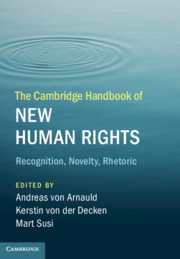Book contents
- The Cambridge Handbook of New Human Rights
- The Cambridge Handbook of New Human Rights
- Copyright page
- Contents
- Figures
- Contributors
- Acknowledgements
- Introduction
- Part I Cross-Cutting Observations
- Part II Public Good Rights
- Part III Status Rights
- Part IV New Technology Rights
- The Right to Internet Access
- The Right to Be Forgotten
- Reproductive Rights
- 24 The Fruits of Someone Else’s Labour
- 25 Birthing New Human Rights
- Genetic Rights
- Part V Autonomy and Integrity Rights
- Part VI Governance Rights
- Index
25 - Birthing New Human Rights
Reflections around a Hypothetical Human Right of Access to Gestational Surrogacy
from Reproductive Rights
Published online by Cambridge University Press: 04 January 2020
- The Cambridge Handbook of New Human Rights
- The Cambridge Handbook of New Human Rights
- Copyright page
- Contents
- Figures
- Contributors
- Acknowledgements
- Introduction
- Part I Cross-Cutting Observations
- Part II Public Good Rights
- Part III Status Rights
- Part IV New Technology Rights
- The Right to Internet Access
- The Right to Be Forgotten
- Reproductive Rights
- 24 The Fruits of Someone Else’s Labour
- 25 Birthing New Human Rights
- Genetic Rights
- Part V Autonomy and Integrity Rights
- Part VI Governance Rights
- Index
Summary
It is clear from Roseman’s excellent chapter that there is not currently an international human right for aspiring parents who cannot otherwise reproduce to access gestational surrogacy. While claims for such a right exist and discussions are taking place about its contours, it would seem that currently we cannot even say that such a right is emerging under international law. In fact, gestational surrogacy is typically considered as an actual or potential violation of human rights. Yet Roseman sketches a convincing scenario in which the de-medicalisation of infertility, and the push for ever fuller inclusion of (inter alia) persons with disabilities and same-sex couples would lead to a new view in which banning gestational surrogacy would be untenable under international human rights standards, and in which states might even have a positive obligation to facilitate access to it.
- Type
- Chapter
- Information
- The Cambridge Handbook of New Human RightsRecognition, Novelty, Rhetoric, pp. 326 - 332Publisher: Cambridge University PressPrint publication year: 2020

